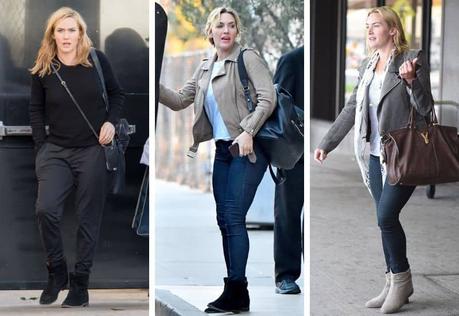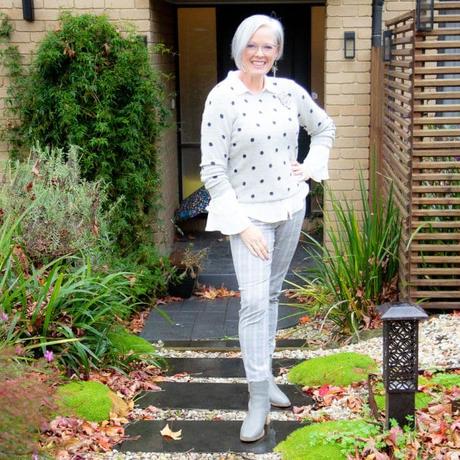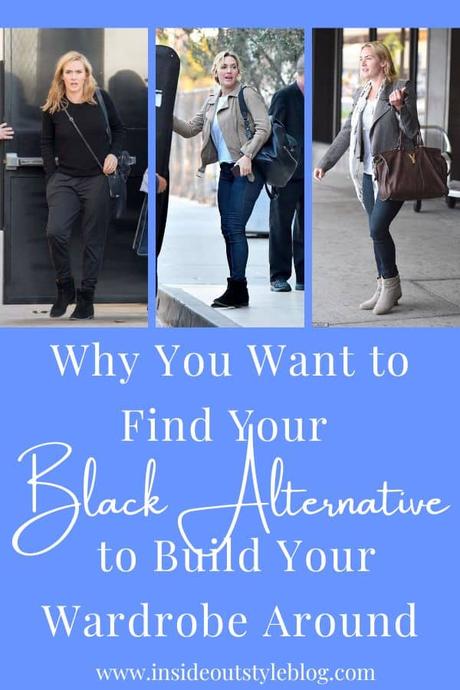



Having worked with thousands of wonderful women over the past couple of decades I know (as they have told me repeatedly) that they wear black because they have come to believe it’s the most slimming colour (and they tell me that this is one of their dressing goals), that it also “goes with everything” and it’s just so easy to buy as there is always lots of black in stores.
Black has become a fall-back for so many because they don’t see the other options. They are not sure of what other colours will work for them and they have come to believe the misinformation (black is always the most slimming, the most sophisticated etc.) that is fed to us all the time.
Discover Why You Want to Find Your Black Alternative to Build Your Wardrobe Around
&iv;&modestbranding;&rel;&autohide;&playsinline;&autoplay;
The Properties of Black
If you’re worried about your weight and dressing to flatter your figure, you have probably considered wearing black as black has been touted as slimming because if light colours advance and dark colours recede, then the darkest is black – therefore – it MUST be the most slimming. Yet this doesn’t take intensity (another of the 3 properties of colour) into the equation. Intensity influences how we perceive colours too, with bright colours advancing and muted or greyed down colours receding – and what is black? Well, it’s actually a very intense bright colour (otherwise if it was greyed down, we’d actually call it … grey!).
So yes black has a receding quality because it’s dark, but it has an advancing quality because it’s bright. There are many other more slimming colours than black, and what yours are will come down to your own colouring!
Now you may say “but I’ve seen that when I wear black in photos I always look slimmer”. And this is true in photos often, as a camera lens does not have the acuity of the human eye, and it can’t bring into focus the contours of your body in the way our eyes can. Our eyes are far more sophisticated and they can pick up these subtle changes easily. Since most of us spend more of our lives seeing people in the flesh, rather than in photographs, it’s definitely working out what your best neutrals are, the ones that make you feel slimmer (if that’s one of your dressing goals) as well as enhancing your features.
Black is also a cool colour, and so works much better with other cool colours, in particular, cool bright colours (as they have those two properties in common rather than just one) and so when building a wardrobe you want to think about looking for a great staple neutral in the same undertone and intensity as your colours, and black may not be it!
Notice how in the images above of Kate Winslet, in the black her head looks almost detached from her body – there is no harmony between her and her clothing. Yes in the photo the black is disappearing into the dark background, but since you can’t always be standing against a dark background (and most walls are painted some version of white) then your body won’t be fading into the background either. Whilst in the beige jacket and the grey jackets in the following two images, you see Kate as a whole person. Notice in the second photo how you are drawn to her black boots, this is because they are unrelated to her colouring. Whilst in the light boots on the right, yes you notice them but then your eye is drawn back up as they relate to both her jacket and her hair creating a visual loop.
What is black?
In the visible spectrum, white reflects light and so is actually a presence of all colours. True black is the absence of colour. Black is what happens when no light at all reaches your eye. Except, of course, that we almost never see pure black, unless you are lucky (or unlucky) enough to stare into a black hole. If you are interested in how researchers are developing the real pure version of black, check out this video.
Alongside white, black is one of the first recorded colours used in art, the pigment created by early humans who used charcoal, burnt bones, or various crushed minerals.
Finding Your Best Neutrals
Black can also be one of the least flattering neutrals you can wear next to your face unless you have cool, deep and bright colouring. It can drain you of your natural colour and highlight all of the dark and shadowy spaces making you look older and tired. If colour is reflected light rays, black being the absence or aborption of light, reflects shadows onto your face, making any line or wrinkle look deeper and darker.
Your most slimming neutrals will relate to your colouring, start with your hair or your eyes, whichever is the darker of the two to find your best darker neutrals. And if you are lighter in colouring, then a medium or medium dark is as dark as you need to go, to look very dark and receding compared to your skin and hair.
What is the best black alternative?
There are a few options when looking for an alternative for black and they will come down to your own colouring and preferences.
If you have warm colouring, almost anything is better than black for you!
Wearing a colour very similar to your hair colour will be a great neutral option that is sliming. For more on choosing neutrals, read How to Select Your Best Neutrals
Almost any medium-value colour that is not bright will give you a slimming effect without draining your complexion – think shades of navy, mid-charcoal, chocolate, forest green or deep burgundy.

Now that my hair is grey, I go for medium to lighter greys as my best neutral to build my wardrobe around.
A column of colour is another way to look taller and thinner without using black. A column of colour is where you wear one colour from shoulder to hemline, creating one long unbroken vertical line.
A busy print is also great as it can hide what’s going on underneath the garment so normal skin lumps and bumps are much less apparent than when wearing solid colours. Check out more tips on wearing sliming prints here…
Finding Your Best Black Alternatives!
Colours can make a significant impact on how your clothes look on you. Black only works for a small proportion of the population – those of us who are cool and bright, despite the fact more black is sold in stores than any other colour.
In reality, your most flattering colours are the most slimming. The right colours create a focus on your face and they harmonise with you, so you don’t draw attention to areas of your body that you’re keen to camouflage.
Personal colour analysis is the best tool you can have because you’ll discover your best neutrals and your most slimming colours. Colour analysis answers what colour suits me? What colours harmonize with my skin complexion, eye colour, and hair colour? What colours make me look alive, vibrant and exiciting?
I provide online colour analysis if you’d like to know more about the best colours specifically for you. Colour analysis is also part of my 7 Steps to Style program if you want the full colour, style and personal image program that you can take at your own pace online.
Further Reading
Why Black May Not Be Your Best Friend- Busting the Black Myth
How to Build a Wardrobe of the Right Neutral Basics For You
Understanding Colour Systems and Personal Colour Analysis
How to Select Your Best Neutrals






